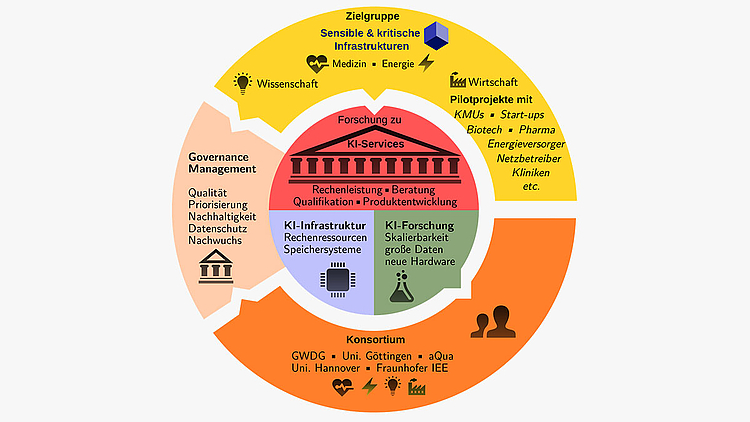Since the beginning of November, the German Federal Ministry of Education and Research (BMBF) has been funding four AI service centers in Germany, which are intended to facilitate access to computing infrastructure and AI expertise and to promote the transfer of AI on a broad scale by providing low-threshold services.
One of these centers is the joint project “AI Service Center for Sensitive and Critical Infrastructures (KISSKI)”, in which Leibniz Universität Hannover is also involved with the L3S research center. Led by the University of Göttingen, the project is funded by the BMBF with 17 million euros over a period of three years.
Other project partners are the Gesellschaft für wissenschaftliche Datenverarbeitung mbH Göttingen (GWDG), aQua – Institut für angewandte Qualitätsförderung und Forschung im Gesundheitswesen GmbH, Göttingen, and the Fraunhofer Institute for Energy Economics and Energy System Technology, Kassel. The goal is to establish a service center for AI that will provide various user-centered services and conduct supporting research.
The research focuses on the fields of medicine and energy because, as critical infrastructures, these have special requirements for the secure handling of sensitive data. Pilot projects are also planned in the joint project, for example with small and medium-sized enterprises and startups, in order to test and validate the services developed.
LUH will support the project with twelve scientists. The team is essentially researching challenges of hyperparameter optimization, reconfigurability, data science and efficient representations of data. Both the University of Göttingen and LUH will receive extensive funding in the project for the core technical infrastructure of KISSKI, consisting of two decentralized clusters with GPU systems and various innovative architectures.
At LUH, L3S member Prof. Dr.-Ing. Bodo Rosenhahn from the Institute of Information Processing is coordinating the project. For him, two aspects of the project are particularly important: First, the system operates redundantly, meaning that if the center in Göttingen fails, calculations in Hannover can continue seamlessly. Second, a major focus is on developing efficient machine learning methods to keep energy consumption and the resulting costs low. “With this project, we are addressing very current challenges of recent times. I look forward to further strengthening Lower Saxony as an AI location,” says Professor Rosenhahn.


